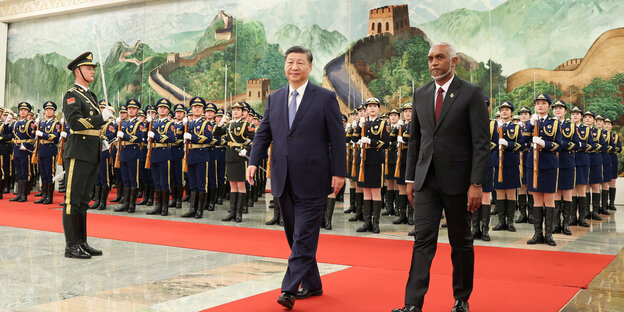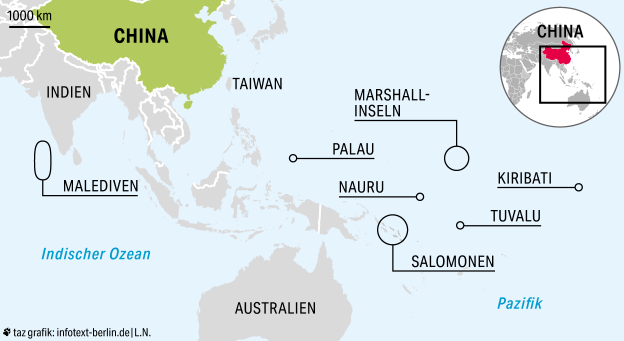The Maldives is demanding the withdrawal of Indian military personnel after an advertising campaign by Indian newspapers strained relations between the two countries.

Closer relationship: Maldivian President Muizzu's visit to Chinese President Xi Jinping in Beijing Photo: cnsphoto/Reuters
MUMBAI taz | Maldives has given an ultimatum to India to end its small military presence on the tropical island paradise. The 88 Indian soldiers of a maritime surveillance unit and aircraft who have been stationed there since 2010 should withdraw by March 15, President Mohamed Muizzu demanded on Sunday. The former conservative mayor of Malé had already called for the withdrawal during the election campaign.
During his previous tenure as construction minister, Muizzu had forged close ties with China. He coordinated prestigious projects funded by Beijing. While Muizzu increasingly called on India to withdraw the army from him, he concluded an agreement with China around the same time. Maldives owes the People's Republic about $1.37 billion, one-fifth of the Maldives' total national debt. The agreement aims to facilitate payment. China also pledged financial assistance of $130 million for development projects.
Muizzu's change of course is not surprising. His political mentor, former President Abdulla Yameen, was already known for his pro-China attitude.
But the Maldivian opposition is sounding critical tones. Opposition leader Fayyaz Ismail of the Democratic Party emphasized that the pro-India policies of many parties in the Maldives were “critically important” for the “security and stability of the island state”. It's sad that a few tweets can shake this relationship. With the “tweets”, Ismail refers to a dispute on social networks that has been heating up the mood in the Maldives and India for days and that triggered the crisis.

Boycott calls
Indian newspapers surprised the Maldives with advertisements: they did not advertise this paradisiacal holiday destination in the Indian Ocean, also popular with Indians, but called for reservations to be suspended for the island state. Calls for a boycott began after Maldivian politicians mocked photographs of Indian Prime Minister Narendra Modi on stunning beaches in the Indian archipelago of Lakshadweep.
China is now benefiting from the diplomatic conflict. The Maldives lies along one of the busiest maritime trade routes, through which almost 80 percent of Chinese oil imports pass. For India, a Chinese military presence in its own backyard would be a threat. Meanwhile, there is speculation in India whether the Maldives will be the next country to fall into the Chinese debt trap.